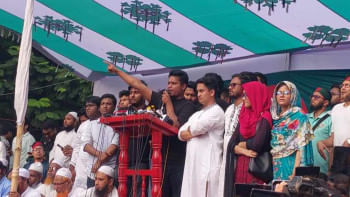Who should blink first: Nawaz Sharif or Imran Khan?
THE deadly floods sweeping through Kashmir in both India and Pakistan have brought the two hostile neighbours closer together. In a gesture of goodwill, Indian Prime Minister Narendra Modi has written to his Pakistani counterpart Nawaz Sharif offering assistance in the relief efforts for the victims of the unprecedented floods. But will the calamity bring Sharif's adversaries at home closer to him?
Imran Khan, a cricketer-turned politician, and Tahirul-ul-Qadri, a cleric, started a protest march in August to oust Nawaz Sharif's government over allegations of massive rigging of the 2013 general election even though both local and foreign observers considered the election to be reasonably fair. After a month-long demonstration, the number of protesters has dwindled from thousands to hundreds but the confrontation is continuing. Recently, Imran Khan told his supporters, “I think it's a battle of nerves. It's a matter of who buckles under the pressure first.”
Nawaz Sharif met with army Chief General Raheel Sharif in a bid to diffuse the crisis. It was believed that the general would play the role of a mediator. There were also speculations that the army would step in. Seven protesters were killed and over 300 injured when police intervened. In order to strengthen his position, Nawaz Sharif called a joint session of the parliament and got the full backing of the lawmakers. Apparently, the army has taken a back seat now and is engaged in relief operations.
There are allegations of collusion between Imran Khan and the army. Zulfikar Ali Bhutto colluded with the army before the war of independence in 1971. Luckily for us, it resulted in the creation of Bangladesh. Though Bhutto became the president and later prime minister of the remainder of Pakistan, he could not survive for long. He was ousted by General Ziaul Huq in 1977 and hanged two years later. Even his daughter and former Prime Minister Benazir Bhutto was assassinated when General Pervez Musharraf was the president of Pakistan. Now he faces charges for the murder of Benazir Bhutto.
If he takes lessons from history, Imran Khan will be wise not to be a tool in the hands of the army. He cannot forcefully oust a duly elected government in a parliamentary democracy. If he does, he will likewise be ousted in no time if he ever comes to power. Instead, he should try to strengthen the fragile democracy in Pakistan and wait patiently for the next election..
No, it is not a battle of the nerves. It is a matter of survival of democracy. It is, therefore, time for Imran Khan to blink first.
The writer is a former chief engineer of Bangladesh Atomic Energy Commission.

 For all latest news, follow The Daily Star's Google News channel.
For all latest news, follow The Daily Star's Google News channel. 



Comments